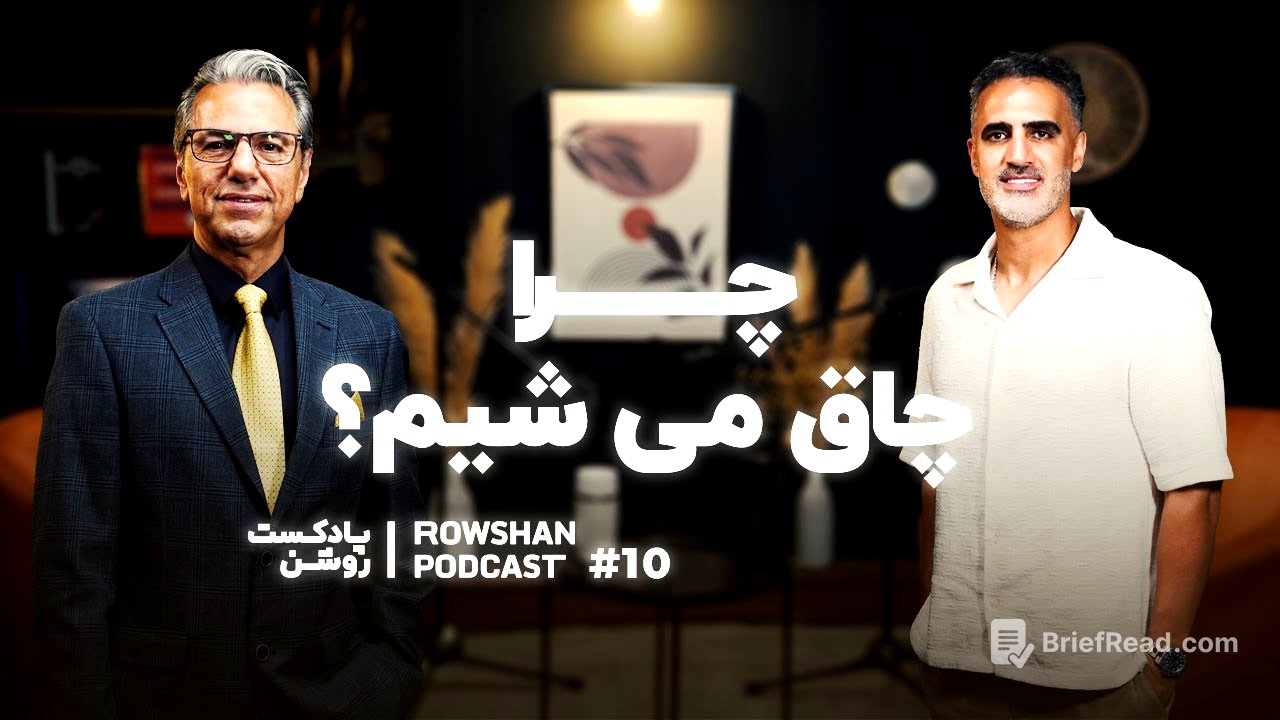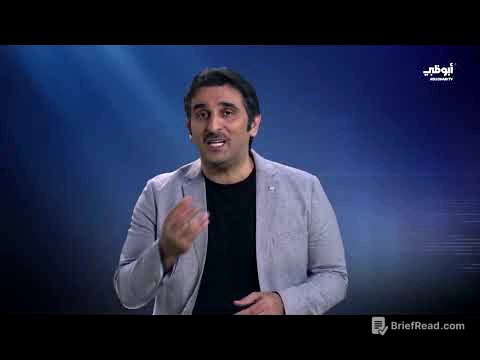TLDR;
This video features a discussion about insulin resistance, its causes, symptoms, and management strategies. It covers the role of carbohydrates and sugars in the body, the impact of diet and lifestyle choices on insulin sensitivity, and the importance of understanding individual responses to food. The speakers also touch on the effects of stress, sleep, and exercise on overall health and insulin function, and debunk common myths about dieting and weight loss.
- Insulin resistance and its impact on the body
- The role of carbohydrates and sugars in insulin resistance
- Lifestyle and dietary strategies for managing insulin resistance
- The importance of personalized approaches to diet and exercise
Introduction [0:00]
The video starts with a brief introduction by the host, who expresses gratitude to the guest, Dr. Babak Jamalian, for his continued presence on the show. They acknowledge the numerous questions and concerns from viewers regarding weight gain and related health issues. The host emphasizes the importance of providing practical information that viewers can apply to their daily lives for better health outcomes.
Understanding Insulin and Sugar [0:31]
The discussion begins by clarifying the role of sugar in the body, noting that our brain cells crave sugar, but it's important to understand that "sugar" refers to carbohydrates from various sources, not just the cubed sugar we add to tea. A piece of toast, for example, contains 4 grams of sugar. The conversation transitions into explaining insulin's function, which is to manage the sugar levels in our blood.
How Insulin Works [3:11]
When we eat, the food is broken down into proteins, fats, and carbohydrates. Insulin is secreted to manage these nutrients. When carbohydrates enter the body, sensors detect the sugar and insulin is released. Insulin's job is to transport sugar from the blood into cells for energy or storage. If there's excess sugar, insulin directs it to be stored as fat in adipose tissue.
Insulin Resistance Explained [7:41]
Insulin resistance occurs when cells become less responsive to insulin's signal to absorb sugar. This can happen over time due to continuous consumption of sugary foods and constant insulin secretion. The cells eventually "burst" and resist insulin's attempts to bring in more sugar. This resistance forces the pancreas to produce more insulin, leading to a state where the body is producing excessive amounts of insulin to maintain normal blood sugar levels.
The Impact of Modern Lifestyle [12:50]
The discussion highlights how our modern lifestyle, with constant access to food and technology, contributes to insulin resistance. Our ancestors had to hunt and gather food, which meant they ate less frequently and were more active. Today, the abundance of food in supermarkets and the ease of ordering meals with a touch of a button have led to continuous eating and increased health problems.
Types of Sugars and Their Effects [14:23]
The conversation shifts to different types of sugars, including glucose, fructose, and lactose. Fructose, found in fruits, needs to be broken down in the liver, and excessive consumption can be problematic. The speakers caution against giving children too many sugary snacks and emphasize the importance of traditional, healthier snacks like nuts and raisins.
Insulin Resistance in Specific Conditions [16:50]
The video addresses insulin resistance in specific conditions like pregnancy and puberty, where the body naturally becomes more insulin resistant to support growth. During these times, it's crucial to avoid excessive sugar intake. The speakers also touch on the role of protein and fat in the diet, noting that they don't cause insulin levels to spike as much as carbohydrates do.
Insulin and Cancer [19:34]
The discussion explores the connection between insulin and cancer, explaining that cancer cells primarily feed on sugar. Healthy cells can use ketones for energy, but cancer cells cannot. This is based on the book "Metabolic Cancer" by Professor Seyfried. The speakers emphasize that a diet low in sugar can help manage and prevent cancer.
Practical Ways to Burn Fat [20:07]
The video provides practical advice on burning fat, such as exercising in the morning without eating breakfast. They also mention the benefits of sumac, an antioxidant that can reduce insulin resistance. The importance of prioritizing sugar over fat for energy is highlighted, explaining that the body will burn sugar first before turning to fat.
Ketogenic Diet and Its Effects [22:05]
The ketogenic diet, which reduces carbohydrate intake, is discussed as a way to shift the body's primary fuel source from sugar to fat. When fats are broken down, they produce ketones, which can be used by most cells for energy. However, it's noted that even with a zero-carb diet, the body will still produce glucose for cells that need it, potentially burning muscle in the process.
Brain Function and Sugar [23:30]
The speakers address the misconception that the brain needs sugar to function, clarifying that brain cells can use ketones effectively. They explain that ketones can cross the blood-brain barrier, providing an alternative fuel source for the brain.
Mitochondria and Cancer Cells [24:31]
The discussion returns to cancer cells, explaining that they have damaged mitochondria and can only burn sugar for fuel. This is why reducing sugar intake can be an effective strategy in managing cancer.
Signs of Insulin Resistance [28:41]
The video outlines several signs of insulin resistance, including fatigue, sugar cravings, ovarian cysts in women, acne, and dark patches on the skin, particularly around the neck and underarms. The speakers emphasize the importance of getting tested and knowing your blood sugar and fasting insulin levels.
Dietary Recommendations for Managing Insulin Resistance [33:35]
The speakers provide dietary recommendations for managing insulin resistance, such as eating a substantial breakfast, having lunch if desired, and enjoying fruit in moderation. They advise against eating late at night and emphasize the importance of fiber in the diet.
Weight Loss Drugs: Benefits and Drawbacks [35:37]
The conversation shifts to weight loss drugs like Manjaro and Azam Peak, acknowledging their effectiveness but cautioning against their indiscriminate use. These drugs, which contain GLP-1, can paralyze the stomach and reduce appetite. However, they can also lead to muscle loss and other complications.
The Importance of Enjoyment and Balanced Lifestyle [36:54]
The speakers stress the importance of finding joy in activities other than eating, such as spending time with loved ones, playing sports, and going to the cinema. They emphasize that eating should be one of many pleasures in life, not the sole source of happiness.
Muscle Loss and Weight Loss Drugs [41:11]
The video highlights the issue of muscle loss associated with weight loss drugs, citing a meta-analysis that shows a significant portion of weight loss comes from muscle. They recommend eating more protein and following a proper diet to minimize this side effect.
Sustainable Weight Loss Strategies [45:03]
The speakers advocate for sustainable weight loss strategies that are both affordable and maintainable in the long term. They caution against relying solely on quick fixes and emphasize the importance of addressing the root causes of weight gain.
The Role of Stress and Hormones [53:27]
The discussion explores the impact of stress on hormone levels and eating habits. Cortisol, the stress hormone, can cause the body to release sugar into the bloodstream, leading to increased blood sugar levels even without eating. They advise managing stress through relaxation techniques and ensuring adequate sleep.
Calorie Counting and Its Limitations [58:02]
The speakers challenge the conventional wisdom of calorie counting, arguing that it's not just about how many calories you eat, but what you eat and when you eat it. They emphasize the importance of hormonal balance and the body's natural processes in weight management.
Artificial Weight Loss Methods [59:32]
The video critiques artificial weight loss methods like liposuction, stomach shrinking, and gastric balloons, highlighting their potential drawbacks and side effects. They explain that these methods often fail to address the underlying issues and can lead to further health problems.
The Importance of a Balanced Diet [1:05:35]
The speakers reiterate the importance of a balanced diet, emphasizing that it's okay to enjoy treats like cake in moderation. They recommend pairing sugary foods with fiber, protein, and healthy fats to mitigate their impact on blood sugar levels.
Apple Cider Vinegar and Fiber [1:21:30]
The benefits of apple cider vinegar and fiber are discussed as tools to manage blood sugar levels. Apple cider vinegar can delay the absorption of sugar, while fiber can slow down the digestive process. They recommend drinking a glass of water with apple cider vinegar before meals and eating a salad to create a natural "balloon" in the stomach.
Personalized Health and Lifestyle [1:27:24]
The speakers emphasize that health is not black and white and that everyone's body responds differently to food and exercise. They caution against blindly following trends and encourage viewers to find what works best for them.
Fasting and Autophagy [1:33:25]
The video explores the benefits of fasting, including reduced insulin levels and increased fat burning. They also discuss autophagy, a process where the body cleans out damaged cells. They advise starting slowly and consulting with a doctor before embarking on a fasting regimen.
Fatty Liver Explained [1:40:16]
The speakers explain fatty liver disease, clarifying that it's primarily caused by excessive consumption of carbohydrates and fructose, not fat. They use the analogy of a refinery turning into a warehouse to illustrate how the liver's function is impaired.
Treating Fatty Liver [1:45:11]
The video provides advice on treating fatty liver, such as reducing carbohydrate intake and increasing fat burning. They also mention the importance of monitoring triglyceride levels and good cholesterol.
The Importance of Medical Education [1:47:39]
The speakers discuss the lack of nutrition education in medical school and advocate for more comprehensive training for doctors in this area. They emphasize the importance of prevention and early intervention in managing health problems.
Personal Experiences and Reflections [1:49:58]
The host shares a personal story about his mother's health struggles, emphasizing the importance of understanding insulin resistance and taking proactive steps to prevent it. He expresses his commitment to helping others avoid similar experiences.
Conclusion [1:54:21]
The video concludes with the speakers thanking each other and expressing their gratitude to the audience. They encourage viewers to continue learning and seeking knowledge to improve their health.
cheat day [1:12:00]
The speakers discuss the concept of a "cheat day," suggesting that it's okay to indulge in treats occasionally as long as overall lifestyle and dietary habits are healthy. They emphasize the importance of balance and moderation in maintaining long-term health.









![Peppa Pig - Grampy Rabbit's Dinosaur Park (16 episode / 4 season) [HD]](https://wm-img.halpindev.com/p-briefread_c-10_b-10/urlb/aHR0cDovL2ltZy55b3V0dWJlLmNvbS92aS94b0k4cnJkVHh1NC9ocWRlZmF1bHQuanBn.jpg)